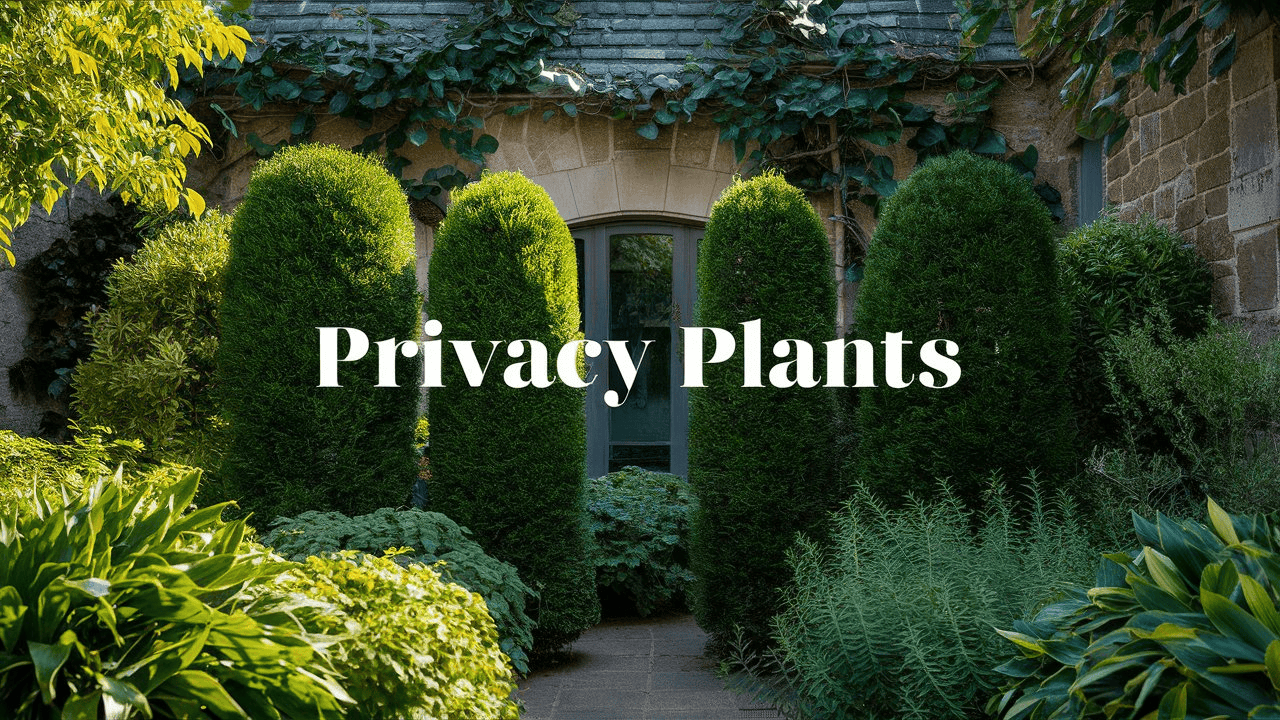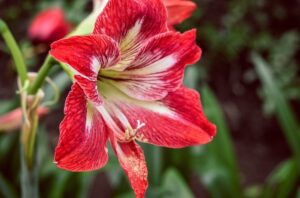Creating a private, secluded oasis in your outdoor space can be a wonderful way to enjoy nature and find respite from the hustle and bustle of everyday life. While fences and walls can certainly provide a physical barrier, strategically planting certain types of greenery can also be an effective and aesthetically pleasing way to establish privacy. In this blog post, we’ll explore three versatile plant options that are well-suited for enhancing privacy in your landscape.
Arborvitae
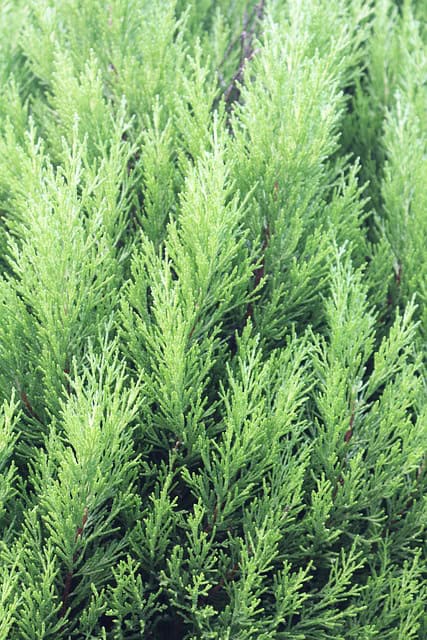
Arborvitae, also known as “American Arbor Vitae,” is a popular evergreen tree that is prized for its dense, columnar growth habit and its ability to provide year-round screening. These hardy, low-maintenance trees can reach heights of 40 to 60 feet, making them an excellent choice for creating a tall, natural privacy hedge or windbreak. Arborvitae thrive in full sun to partial shade and prefer well-drained soil, making them a suitable option for a wide range of growing conditions.
One of the key advantages of arborvitae is their dense, lush foliage, which effectively blocks views and muffles sound. The flat, scale-like leaves remain green throughout the year, providing a consistent, evergreen barrier. Arborvitae can be planted in a row or clustered together to create a cohesive, uniform privacy screen. With proper pruning and maintenance, these trees can be kept at a desired height and width, allowing you to tailor the privacy solution to your specific needs.
Yew
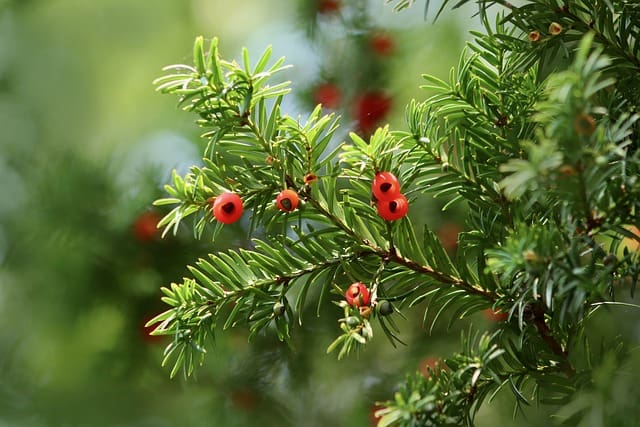
Yew is another evergreen plant that is well-suited for privacy applications. These slow-growing, coniferous shrubs or small trees can reach heights of 30 to 50 feet, depending on the cultivar. Yew is known for its dense, dark green foliage and its ability to maintain its shape and form through regular pruning.
One of the key benefits of yew is its versatility. These plants can be grown as individual specimens, pruned into formal hedges, or trained into unique shapes and structures. Yew’s compact, pyramidal growth habit makes it an excellent choice for creating a tiered, multi-layered privacy screen. Additionally, yew’s tolerance for partial shade and its ability to thrive in a variety of soil types make it a adaptable option for many landscape settings.
Privet
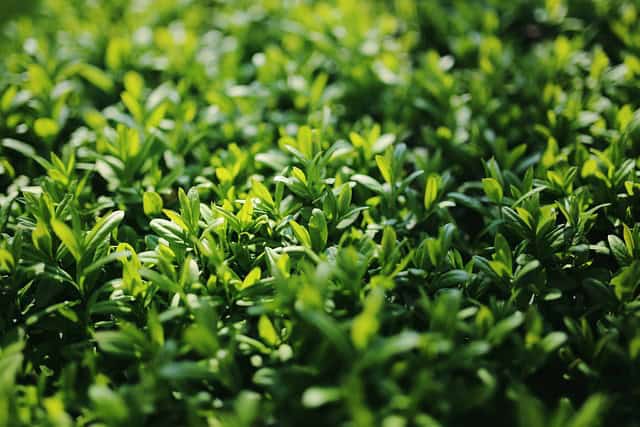
Privet is a fast-growing, deciduous shrub that is often used for creating privacy hedges. These plants are known for their dense, glossy green foliage and their ability to tolerate regular pruning, which allows them to be maintained at a desired height and width. Privet can reach heights of 10 to 15 feet, making it a suitable choice for creating a medium-height privacy barrier.
One of the advantages of privet is its rapid growth rate, which allows it to establish a dense, uniform hedge relatively quickly. Privet can be planted in a single row or in a staggered pattern to create a more layered, visually interesting privacy screen. Additionally, privet’s adaptability to a wide range of soil types and its tolerance for full sun to partial shade make it a versatile option for many landscape settings.
Cherry Laurel
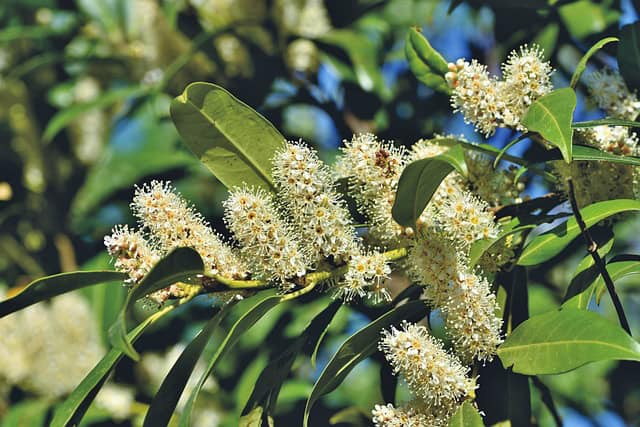
Cherry laurel, also known as English laurel or common laurel, is a broad-leaved evergreen shrub that can serve as an excellent privacy screen. These plants are known for their glossy, dark green leaves and their ability to grow into dense, compact hedges. Cherry laurel can reach heights of 20 to 30 feet, making it a suitable option for creating a medium to tall privacy barrier.
One of the key advantages of cherry laurel is its adaptability to a wide range of growing conditions. These plants thrive in full sun to partial shade and can tolerate a variety of soil types, including acidic, well-drained soils. Additionally, cherry laurel is relatively low-maintenance, requiring only occasional pruning to maintain its desired shape and size.
When planted in a row or grouped together, cherry laurel’s dense, overlapping foliage creates an effective visual and physical barrier, blocking unwanted views and providing a sense of seclusion. The plant’s evergreen nature also ensures that the privacy screen remains intact throughout the year, unlike deciduous options that may lose their leaves during the winter months.
Mock Orange
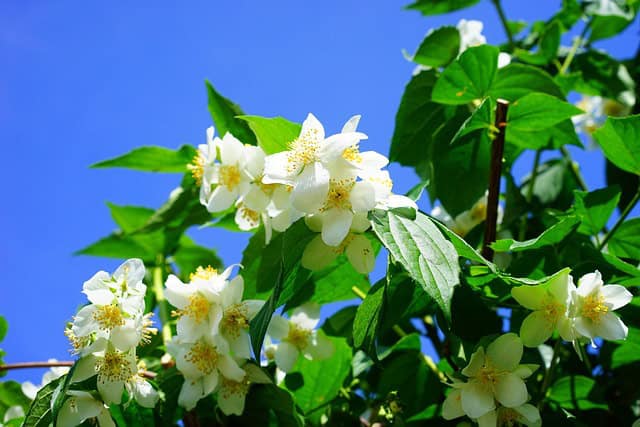
Mock orange, also known as Philadelphus, is a deciduous shrub that is prized for its fragrant, white flowers and its ability to create a dense, privacy-enhancing hedge. These plants can reach heights of 6 to 12 feet, depending on the cultivar, and their arching, multi-stemmed growth habit lends itself well to creating a natural, informal privacy screen.
One of the key advantages of mock orange is its ability to thrive in a variety of soil types, including well-drained, acidic soils. These plants also tolerate full sun to partial shade, making them a versatile option for many landscape settings. Additionally, mock orange’s deciduous nature means that it will lose its leaves in the winter, allowing for more light and visibility during the colder months.
When planted in a row or grouped together, mock orange’s abundant, fragrant blooms in the spring and early summer can create a visually stunning and aromatic privacy barrier. Even after the flowers have faded, the plant’s dense, green foliage continues to provide an effective screen throughout the growing season.
Lilac
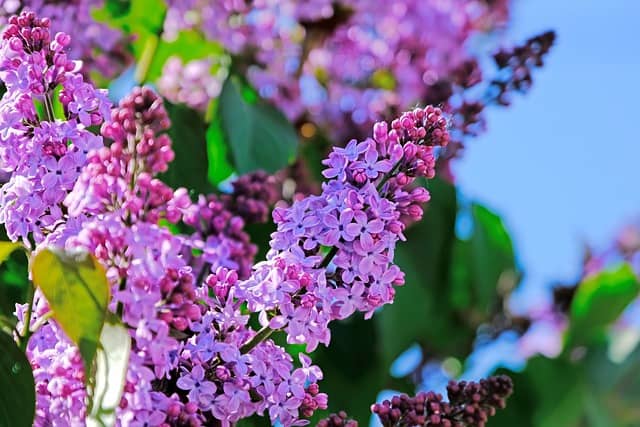
Lilac is a beloved, deciduous shrub that is renowned for its fragrant, spring-blooming flowers and its ability to form dense, privacy-enhancing hedges. These plants can reach heights of 8 to 15 feet, depending on the cultivar, making them a suitable choice for creating a medium-height privacy screen.
One of the key advantages of lilac is its adaptability to a wide range of soil types, including alkaline and clay-based soils. These hardy plants also thrive in full sun, which helps to ensure a robust, prolific bloom cycle. Additionally, lilac’s multi-stemmed growth habit and its tendency to sucker and spread can contribute to the formation of a dense, uniform hedge.
Beyond their visual appeal, lilac’s fragrant blooms can also provide a sensory element to your privacy screen, filling the air with a captivating, floral aroma. This can create a truly immersive and calming experience for those seeking a secluded outdoor retreat.
Forsythia
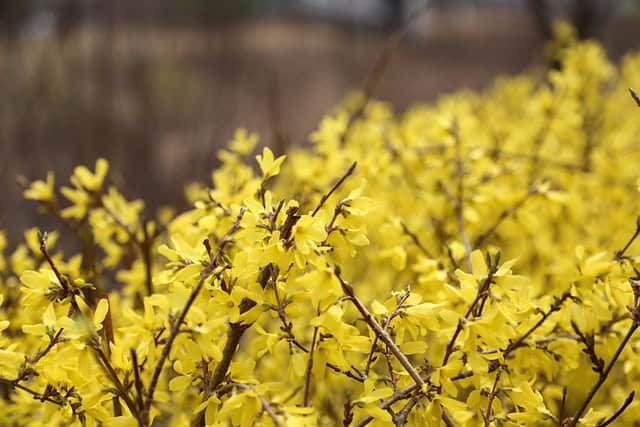
Forsythia is a deciduous shrub that is known for its vibrant, yellow flowers that bloom in early spring, often before the plant’s foliage emerges. These fast-growing plants can reach heights of 8 to 10 feet, making them a suitable choice for creating a medium-height privacy barrier.
One of the key benefits of forsythia is its ability to thrive in a variety of soil types and growing conditions, including full sun to partial shade. These hardy plants are also relatively low-maintenance, requiring only occasional pruning to maintain their desired shape and size.
When planted in a row or grouped together, forsythia’s arching, multi-stemmed growth habit and its dense, green foliage can create an effective visual and physical barrier. The plant’s striking yellow blooms in the spring can also add a vibrant, eye-catching element to your privacy screen, providing a burst of color and visual interest.
Cotoneaster
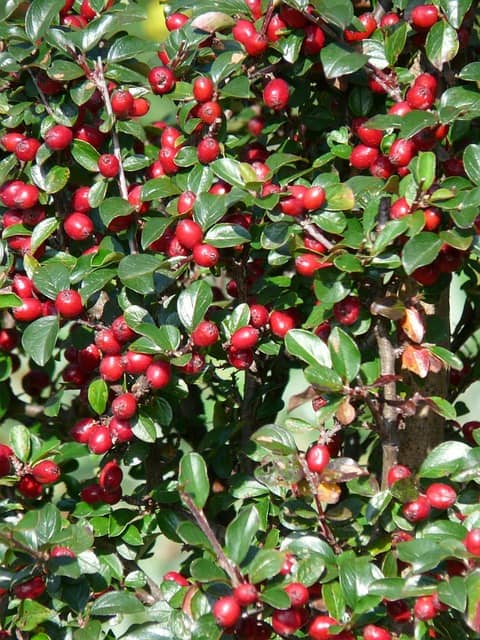
Cotoneaster is a versatile, deciduous shrub that can be an excellent choice for enhancing privacy in your outdoor space. These plants are known for their low-growing, spreading habit and their ability to form dense, compact hedges.
Cotoneaster can reach heights of 3 to 6 feet, making them a suitable option for creating a low to medium-height privacy screen. These plants thrive in full sun to partial shade and can tolerate a wide range of soil types, including poor, well-drained soils.
One of the unique features of cotoneaster is its ability to produce small, berry-like fruits that can provide visual interest and attract wildlife to your landscape. Additionally, the plant’s dark green foliage and its tendency to maintain a dense, uniform growth habit make it an effective choice for creating a cohesive, privacy-enhancing hedge.
Beautyberry
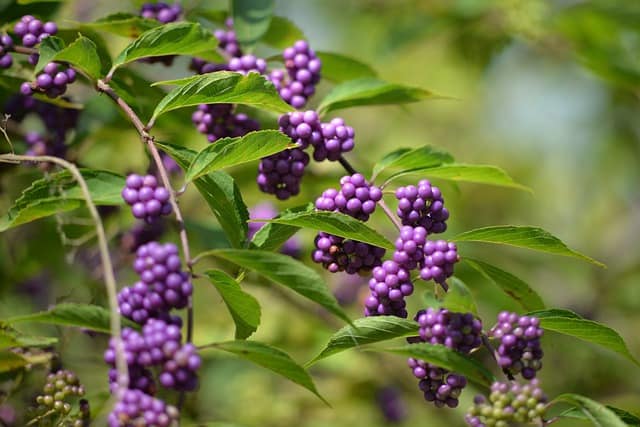
Beautyberry, also known as Callicarpa, is a deciduous shrub that is prized for its vibrant, purple-colored berries that emerge in the fall. These plants can reach heights of 3 to 6 feet, making them a suitable choice for creating a low to medium-height privacy screen.
One of the key advantages of beautyberry is its ability to thrive in a variety of soil types, including well-drained, acidic soils. These plants also tolerate full sun to partial shade, providing flexibility in terms of placement and exposure. Additionally, beautyberry’s multi-stemmed, arching growth habit and its tendency to form dense, compact clusters can contribute to the creation of an effective privacy barrier.
Beyond its privacy-enhancing qualities, beautyberry’s striking, jewel-toned berries can also add a unique, eye-catching element to your landscape. These vibrant displays can provide visual interest and attract a variety of wildlife, such as birds, to your outdoor space.
Common Ninebark
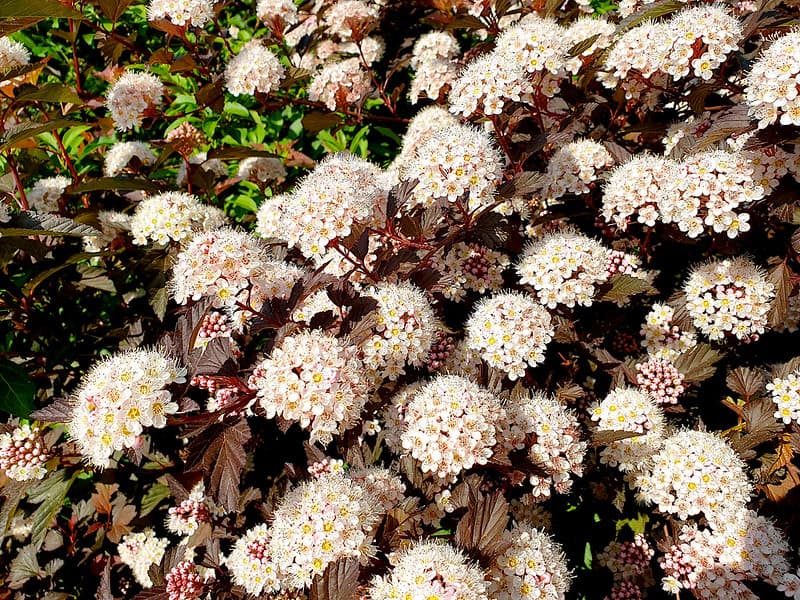
Common ninebark, or Physocarpus opulifolius, is a deciduous shrub that is known for its exfoliating bark and its ability to form dense, privacy-enhancing hedges. These plants can reach heights of 6 to 10 feet, making them a suitable option for creating a medium-height privacy screen.
One of the key benefits of common ninebark is its adaptability to a wide range of soil types, including poor, well-drained soils. These hardy plants also tolerate full sun to partial shade, providing flexibility in terms of placement and exposure. Additionally, ninebark’s multi-stemmed, arching growth habit and its tendency to sucker and spread can contribute to the formation of a dense, uniform hedge.
Beyond its privacy-enhancing qualities, common ninebark’s unique, peeling bark and its ability to produce clusters of white or pink flowers can also add visual interest and seasonal charm to your landscape. These features can create a visually dynamic and engaging privacy screen.
Pussy Willow
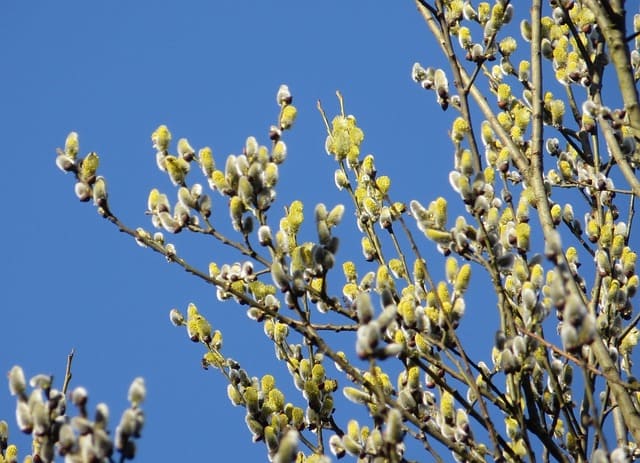
Pussy willow, or Salix discolor, is a deciduous shrub or small tree that is known for its distinctive, fuzzy catkins that emerge in early spring, often before the plant’s foliage appears. These plants can reach heights of 10 to 20 feet, making them a suitable choice for creating a medium to tall privacy screen.
One of the key advantages of pussy willow is its ability to thrive in moist, well-drained soils, including those found near water sources or in low-lying areas. These plants also tolerate full sun to partial shade, providing flexibility in terms of placement and exposure. Additionally, pussy willow’s multi-stemmed, spreading growth habit and its tendency to form dense, compact clusters can contribute to the creation of an effective privacy barrier.
Beyond its privacy-enhancing qualities, pussy willow’s unique, fuzzy catkins can also provide a captivating, tactile element to your outdoor space. These delicate, silvery-gray blooms can create a visually striking and whimsical display, adding seasonal interest and charm to your landscape.
Loropetalum
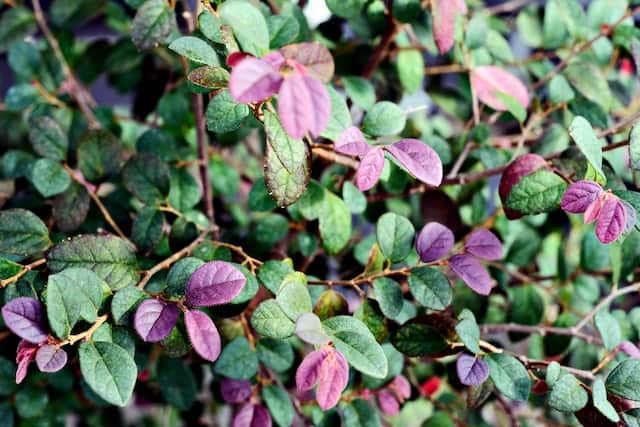
Loropetalum, also known as Chinese fringe flower, is an evergreen shrub that is prized for its vibrant, purple-colored foliage and its ability to form dense, privacy-enhancing hedges. These plants can reach heights of 6 to 10 feet, making them a suitable choice for creating a medium-height privacy screen.
One of the key advantages of loropetalum is its adaptability to a wide range of soil types, including well-drained, acidic soils. These plants also thrive in full sun to partial shade, providing flexibility in terms of placement and exposure. Additionally, loropetalum’s compact, mounding growth habit and its tendency to form a dense, uniform canopy can contribute to the creation of an effective privacy barrier.
Beyond its privacy-enhancing qualities, loropetalum’s striking, purple-hued foliage can also add a unique, eye-catching element to your landscape. The plant’s delicate, fringe-like flowers, which bloom in the spring, can further enhance the visual appeal of your privacy screen.
Canadian Hemlock
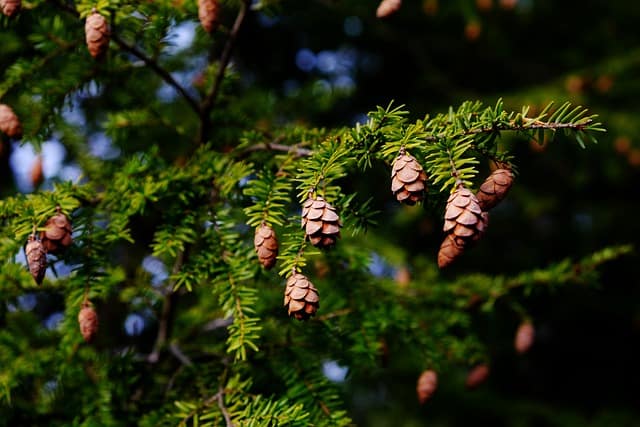
Canadian hemlock, or Tsuga canadensis, is an evergreen conifer that is renowned for its dense, pyramidal growth habit and its ability to create a tall, lush privacy screen. These stately trees can reach heights of 40 to 70 feet, making them a suitable choice for creating a tall, imposing privacy barrier.
One of the key benefits of Canadian hemlock is its tolerance for a wide range of soil types, including acidic, well-drained soils. These trees also thrive in partial shade, which can be particularly advantageous in areas with limited sunlight exposure. Additionally, Canadian hemlock’s dense, overlapping foliage and its ability to maintain its evergreen appearance throughout the year can provide a consistent, year-round privacy solution.
Beyond its privacy-enhancing qualities, Canadian hemlock’s graceful, sweeping branches and its delicate, feathery foliage can also add a natural, elegant aesthetic to your landscape. These trees can create a serene, woodland-inspired ambiance that can enhance the overall tranquility of your outdoor space.
Burning Bush
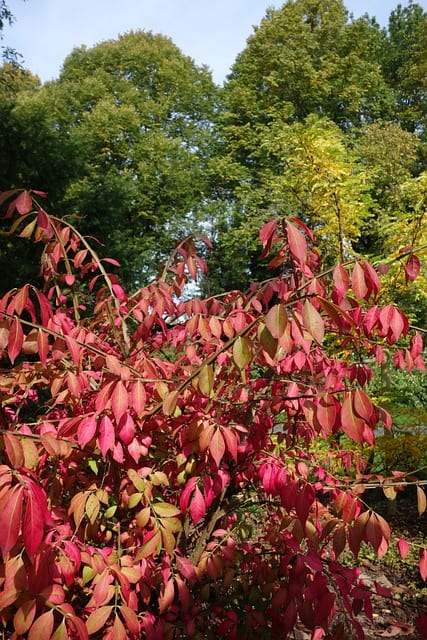
Burning bush, or Euonymus alatus, is a deciduous shrub that is known for its vibrant, fiery-red foliage in the fall. These plants can reach heights of 6 to 15 feet, making them a suitable choice for creating a medium-height privacy screen.
One of the key advantages of burning bush is its adaptability to a wide range of soil types, including well-drained, alkaline soils. These plants also tolerate full sun to partial shade, providing flexibility in terms of placement and exposure. Additionally, burning bush’s multi-stemmed, spreading growth habit and its tendency to form dense, compact clusters can contribute to the creation of an effective privacy barrier.
Beyond its privacy-enhancing qualities, burning bush’s striking, autumnal display can also add a vibrant, seasonal element to your landscape. The plant’s brilliant red foliage can create a captivating visual contrast, especially when planted in conjunction with other deciduous shrubs or trees.
Leyland Cypress
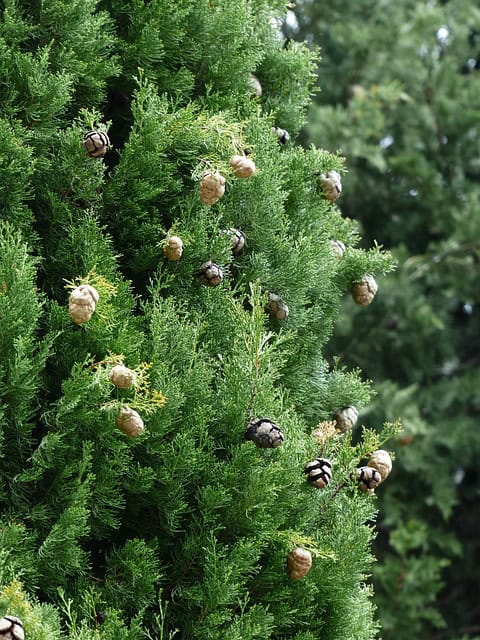
Leyland cypress, or Cupressus × leylandii, is a fast-growing, evergreen tree that is renowned for its dense, pyramidal growth habit and its ability to create a tall, imposing privacy screen. These stately trees can reach heights of 40 to 60 feet, making them a suitable choice for creating a tall, visually impenetrable barrier.
One of the key advantages of Leyland cypress is its tolerance for a wide range of soil types, including well-drained, alkaline soils. These trees also thrive in full sun, which helps to ensure a robust, dense growth pattern. Additionally, Leyland cypress’s overlapping, scale-like foliage and its ability to maintain its evergreen appearance throughout the year can provide a consistent, year-round privacy solution.
Beyond its privacy-enhancing qualities, Leyland cypress’s uniform, symmetrical shape and its ability to be easily pruned can also make it a versatile choice for creating formal, architectural elements in your landscape design. These trees can be shaped and maintained to create visually striking, geometric hedges or screens.
Butterfly Bush
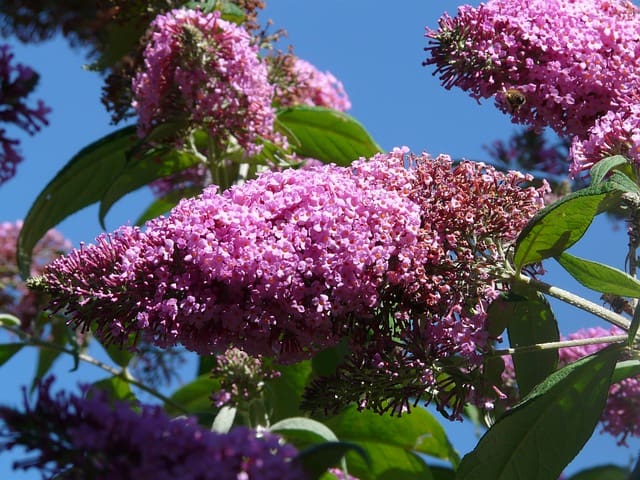
Butterfly bush, or Buddleja davidii, is a deciduous shrub that is prized for its fragrant, nectar-rich flowers that attract a variety of butterflies and other pollinators. These plants can reach heights of 6 to 10 feet, making them a suitable choice for creating a medium-height privacy screen.
One of the key benefits of butterfly bush is its adaptability to a wide range of soil types, including well-drained, nutrient-poor soils. These plants also thrive in full sun, which helps to ensure a prolific bloom cycle. Additionally, butterfly bush’s arching, multi-stemmed growth habit and its tendency to form dense, compact clusters can contribute to the creation of an effective privacy barrier.
Beyond its privacy-enhancing qualities, butterfly bush’s vibrant, colorful flowers, which can range from purple and pink to white and yellow, can also add a visually stunning, pollinator-friendly element to your landscape. The plant’s captivating blooms and its ability to attract a diverse array of butterflies can create a truly enchanting outdoor experience.
Boxwood
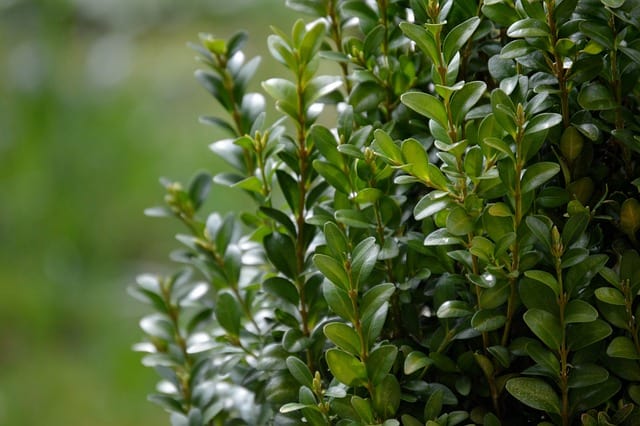
Boxwood, or Buxus, is an evergreen shrub that is renowned for its dense, compact growth habit and its ability to create formal, manicured hedges and screens. These plants can reach heights of 3 to 6 feet, making them a suitable choice for creating a low to medium-height privacy barrier.
One of the key advantages of boxwood is its tolerance for a wide range of soil types, including well-drained, alkaline soils. These plants also thrive in full sun to partial shade, providing flexibility in terms of placement and exposure. Additionally, boxwood’s dense, glossy foliage and its ability to be easily pruned and maintained can contribute to the creation of a cohesive, visually appealing privacy screen.
Beyond its privacy-enhancing qualities, boxwood’s classic, elegant appearance can also add a timeless, formal aesthetic to your landscape design. These plants can be shaped and sculpted into a variety of geometric forms, creating visually striking, architectural elements that can enhance the overall ambiance of your outdoor space.
Holly
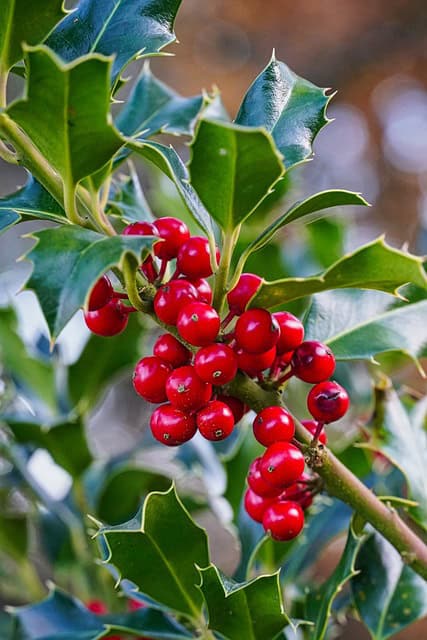
Holly, or Ilex, is an evergreen shrub or tree that is renowned for its glossy, spiny foliage and its ability to create a dense, year-round privacy screen. These plants can reach heights of 15 to 50 feet, depending on the specific variety, making them a suitable choice for creating a medium to tall privacy barrier.
One of the key advantages of holly is its tolerance for a wide range of soil types, including well-drained, acidic soils. These plants also thrive in full sun to partial shade, providing flexibility in terms of placement and exposure. Additionally, holly’s dense, overlapping foliage and its ability to maintain its evergreen appearance throughout the year can provide a consistent, year-round privacy solution.
Beyond its privacy-enhancing qualities, holly’s vibrant, red berries, which often appear in the fall and winter, can add a pop of seasonal color and visual interest to your landscape. These captivating displays can also attract a variety of birds, further enhancing the wildlife-friendly appeal of your outdoor space.
Hydrangea
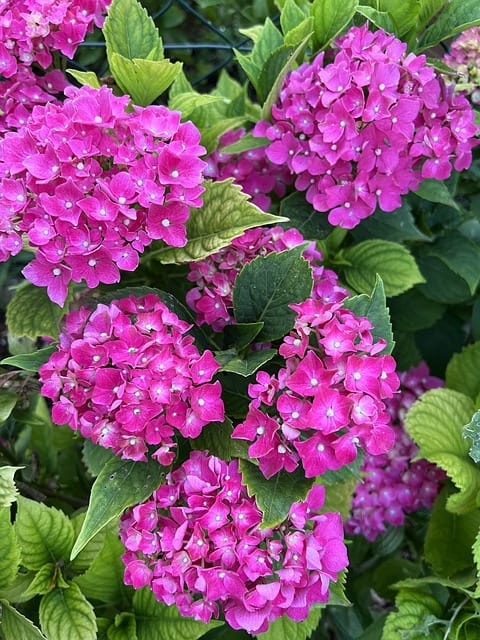
Hydrangea is a deciduous shrub that is known for its large, showy flowers and its ability to create a lush, privacy-enhancing hedge. These plants can reach heights of 3 to 15 feet, depending on the specific variety, making them a suitable choice for creating a low to medium-height privacy screen.
One of the key benefits of hydrangea is its adaptability to a wide range of soil types, including well-drained, acidic soils. These plants also thrive in partial shade, which can be particularly advantageous in areas with limited sunlight exposure. Additionally, hydrangea’s multi-stemmed, mounding growth habit and its tendency to form dense, compact clusters can contribute to the creation of an effective privacy barrier.
Beyond its privacy-enhancing qualities, hydrangea’s captivating, globe-shaped flowers, which can range in color from pink and blue to white and purple, can also add a visually stunning, ornamental element to your landscape. These captivating blooms can create a focal point and enhance the overall aesthetic of your outdoor space.
Juniper
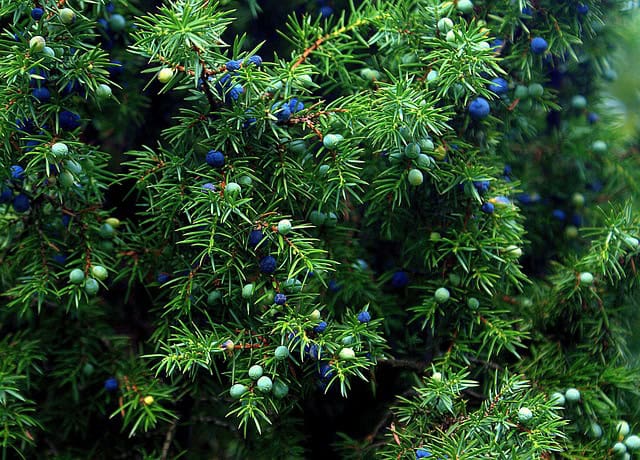
Juniper, or Juniperus, is an evergreen shrub or tree that is known for its dense, needle-like foliage and its ability to create a low-maintenance, year-round privacy screen. These plants can reach heights of 3 to 40 feet, depending on the specific variety, making them a suitable choice for creating a low to tall privacy barrier.
One of the key advantages of juniper is its tolerance for a wide range of soil types, including well-drained, alkaline soils. These plants also thrive in full sun, which helps to ensure a robust, dense growth pattern. Additionally, juniper’s overlapping, scale-like foliage and its ability to maintain its evergreen appearance throughout the year can provide a consistent, year-round privacy solution.
Beyond its privacy-enhancing qualities, juniper’s unique, textural foliage and its ability to be shaped and pruned can also make it a versatile choice for creating architectural, sculptural elements in your landscape design. These plants can be trained into a variety of forms, from low-growing groundcovers to towering, columnar specimens.
Bamboo
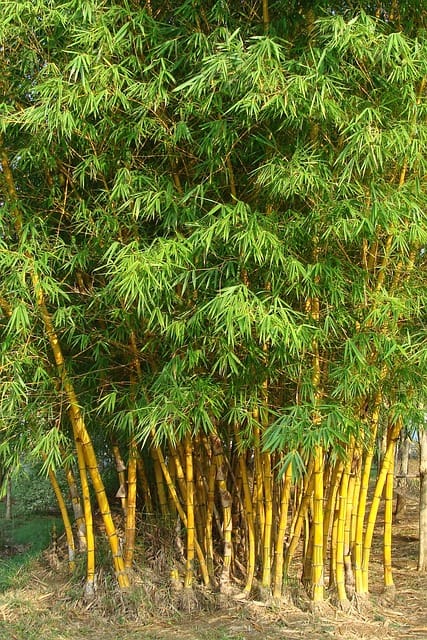
Bamboo is a versatile, fast-growing grass that is renowned for its ability to create a tall, dense privacy screen. Depending on the specific variety, bamboo can reach heights of 10 to 60 feet, making it a suitable choice for creating a tall, visually impenetrable barrier.
One of the key advantages of bamboo is its adaptability to a wide range of soil types, including well-drained, nutrient-rich soils. These plants also thrive in full sun to partial shade, providing flexibility in terms of placement and exposure. Additionally, bamboo’s dense, overlapping culms (stems) and its ability to spread and form a thick, impenetrable stand can contribute to the creation of an effective privacy barrier.
Beyond its privacy-enhancing qualities, bamboo’s unique, architectural form and its ability to sway gracefully in the wind can also add a captivating, natural element to your landscape design. The plant’s diverse range of foliage colors, from vibrant green to striking yellow and black, can further enhance the visual interest of your outdoor space.
Red Twig Dogwood
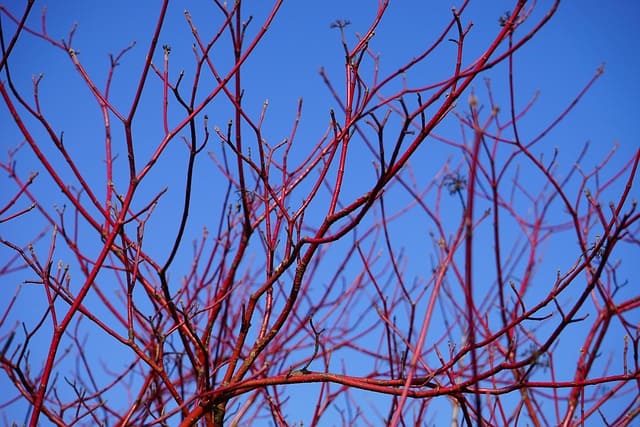
Red twig dogwood, or Cornus sericea, is a deciduous shrub that is known for its vibrant, red-colored stems and its ability to create a dense, privacy-enhancing hedge. These plants can reach heights of 6 to 10 feet, making them a suitable choice for creating a medium-height privacy screen.
One of the key benefits of red twig dogwood is its adaptability to a wide range of soil types, including moist, well-drained soils. These plants also thrive in full sun to partial shade, providing flexibility in terms of placement and exposure. Additionally, red twig dogwood’s multi-stemmed, spreading growth habit and its tendency to form dense, compact clusters can contribute to the creation of an effective privacy barrier.
Beyond its privacy-enhancing qualities, red twig dogwood’s striking, vibrant stems, which are most prominent in the winter months, can also add a unique, seasonal element to your landscape. The plant’s captivating display can create a visually striking contrast against the backdrop of other plants or architectural features in your outdoor space.
Chocolate Vine
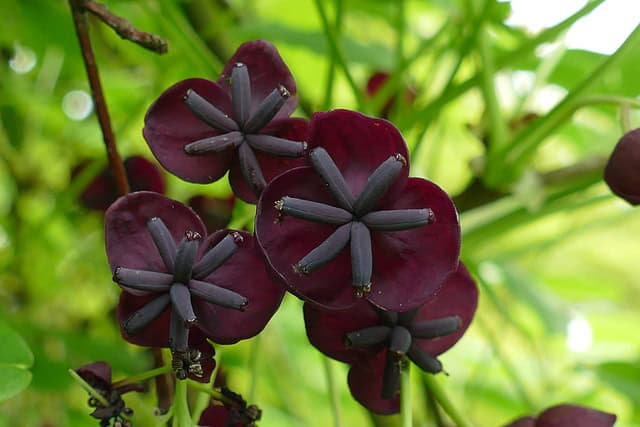
Chocolate vine, or Akebia quinata, is a fast-growing, deciduous vine that is known for its unique, chocolate-scented flowers and its ability to create a lush, privacy-enhancing screen. These plants can reach heights of 20 to 40 feet, making them a suitable choice for creating a tall, vertical privacy barrier.
One of the key advantages of chocolate vine is its adaptability to a wide range of soil types, including well-drained, nutrient-rich soils. These plants also thrive in full sun to partial shade, providing flexibility in terms of placement and exposure. Additionally, chocolate vine’s dense, twining growth habit and its tendency to form a thick, impenetrable canopy can contribute to the creation of an effective privacy screen.
Beyond its privacy-enhancing qualities, chocolate vine’s unique, chocolate-scented flowers, which bloom in the spring, can also add a captivating, fragrant element to your outdoor space. The plant’s delicate, purple-tinged blooms can create a visually striking, ornamental display that can enhance the overall ambiance of your landscape.


